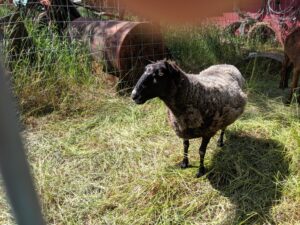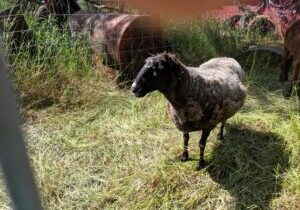Shepherds – More than those who care for sheep
 Popular imagination is based on the historical lived experience of a people. Religious imagery reflects that experience. So today, the Sixteenth Sunday of Ordinary Time, shepherds (and by extension sheep) are showing up in many of the readings. The Hebrew people were descendants of Abram and Sara, a shepherd and his wife from Mesopotamia. They were pastoralists who traveled over a wide area of countryside, seeking the best pastures for their sheep and living from the work of their hands (and feet – with all that walking). God called Abram to a special relationship and promised to be his God through all generations.
Popular imagination is based on the historical lived experience of a people. Religious imagery reflects that experience. So today, the Sixteenth Sunday of Ordinary Time, shepherds (and by extension sheep) are showing up in many of the readings. The Hebrew people were descendants of Abram and Sara, a shepherd and his wife from Mesopotamia. They were pastoralists who traveled over a wide area of countryside, seeking the best pastures for their sheep and living from the work of their hands (and feet – with all that walking). God called Abram to a special relationship and promised to be his God through all generations.
When it came time for the Hebrew people to have kings, the second king was David, a shepherd boy chosen by God to be the successor of Saul. In the Hebrew Scriptures, shepherd is a term often applied to the kings of the land. Sometimes the kings were faithful to the Covenant and sometimes they were not. Either way, the prophets spoke of them as shepherds.
Jeremiah (23:1-6) could see that his people and their kingdom were going to fall when faced by the might of Babylon. But the reason for the coming disaster had nothing to do with military might or the skill of generals. Israel had prevailed against all odds in the past. The failure this time would be the result of the failure of the rulers to be true to the Covenant.
Jeremiah speaks of these rulers as shepherds who have misled and scattered the flock of the Lord. They are not caring for the people as they have been called to do. He cries out that the Lord will be faithful, despite the misdeeds of the rulers. He will gather those who are faithful from among the nations to which they have been exiled and appoint new, faithful shepherds to guide and protect his flock.
This prophesy concludes with the messianic promise of a new king from David’s line who will shepherd the people wisely and be known as “The Lord of Justice.”
The Twenty-third Psalm is rightly loved for its promise of the loving care of the Lord who acts as a shepherd for his flock. Not only does the shepherd guide and protect the flock, the shepherd honors those for whom he cares, even in the face of those who would hurt them. Goodness and kindness characterize the care of the shepherd. The sheep, all of us in his care, will dwell in the Lord’s house for years to come.
With the coming of Jesus and the welcoming of Gentiles into the flock of the Lord as well, the divisions between peoples of the world are broken down. (Eph 2:13-18) No longer is anyone to be excluded from the flock of the Lord of Justice. The divisions among the peoples of the world were destroyed by the cross. Through Jesus, we all have access to the Father in one Spirit. The shepherd now has called the sheep from around the world and united us into one flock.
The Gospel this week (Mk 6:30-34) continues last week’s story. Remember that Jesus sent out his followers to heal the sick and call people to repentance, to turn their lives back to God. This week they have returned. Mark calls them apostles now, those who have been sent. Jesus takes time to talk with them about their experience and invites them to take some time to rest, in a deserted place, away from regular life and the crowds of people who kept coming to hear and see him. However, they can’t get away on foot, so they get on the boat and head out onto the Sea of Galilee. Even that doesn’t work. The people see where they are going and walk there themselves, around the shore of the lake. When Jesus and his friends arrive, the crowds are already there.
Did Jesus get angry, get back on the boat and sail away? No. St. Mark tells us, “His heart was moved with pity for them, for they were like sheep without a shepherd.” He sat down and began to teach them. The shepherd had arrived. The Lord of Justice has come to his people.
Today we are challenged to be good shepherds to those sent to our care. It may be children, spouses, fellow workers, the old or the young, or people we meet on the street. How do we share the love of the Lord of Justice, the shepherd who truly cares for and loves his flock? And then, how do we rest in the green pastures to which that same Lord leads us, so we can be refreshed? Both outreach and times to rest and be renewed are essential. Summer is a good time for both.
Read More









